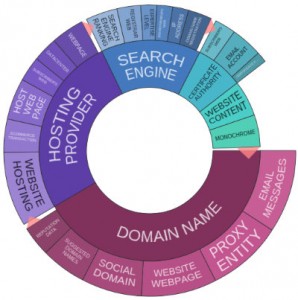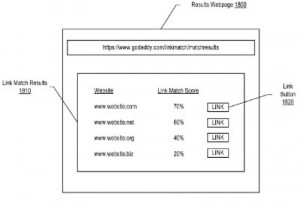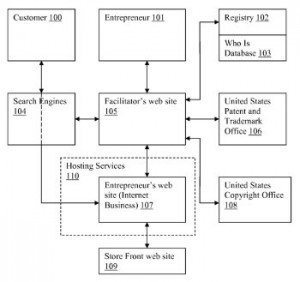![]() GoDaddy Inc., an Internet domain registrar headquartered in Scottsdale, AZ, is likely best known for its racy advertising campaigns, much of which featured NASCAR driver Danica Patrick. However, with its initial public offering set to take place soon, the company is looking to mature into a publicly traded corporation with a market valuation that approaches $2.9 billion. This will be aided by a small but meaningful patent portfolio made up of nearly 150 U.S. patents, which cover core innovations relating to domain name valuation, domain name hijacking prevention and methods for creating an Internet business.
GoDaddy Inc., an Internet domain registrar headquartered in Scottsdale, AZ, is likely best known for its racy advertising campaigns, much of which featured NASCAR driver Danica Patrick. However, with its initial public offering set to take place soon, the company is looking to mature into a publicly traded corporation with a market valuation that approaches $2.9 billion. This will be aided by a small but meaningful patent portfolio made up of nearly 150 U.S. patents, which cover core innovations relating to domain name valuation, domain name hijacking prevention and methods for creating an Internet business.
The amended S-1 filed by GoDaddy with the U.S. Securities and Exchange Commission in late February unveiled some pretty notable pieces of information. Publicly traded shares of stock in the company will initially be priced in a range from $17 to $19 each. If each of the 22 million shares which the company plans on offering are sold at the high end of that range, it could net the company $418 million. The company is also reporting a rising total customer base that has grown from 8.225 million customers in 2010 up past 12.7 million during 2014. Optimism in GoDaddy’s chances can also be seen reflected in the company’s shrinking net loss, from $279 million in 2012 to $143 million in 2014. Revenues have also been increasing from $910.9 million in 2012 to $1.387 billion in 2014.
The filing is also interesting for not including certain pieces of information important to those who want to follow the IPO. Namely, this includes the date of the IPO itself. The S-1 filed by GoDaddy with the SEC merely states that the date of proposed sale to the public will be “as soon as practicable after this registration statement becomes effective.” Other potential date fields in the filing are also left blank on the digital copy of the S-1 filing that we linked in the above paragraph. A Wall Street Journal article on the IPO states that shares will be offered during a roadshow that could be occurring this week; other sources have given April 1st as a potential IPO date.
It’s understood that most of the money raised by the GoDaddy IPO will be used to pay the private-equity firms that invested heavily in the company as a result of a 2011 buyout; these include KKR & Co., Silver Lake and TCV Investments. As part of that $2.25 billion deal, GoDaddy agreed to take on debt that the company hopes that the IPO will help to retire in large part. None of the holdings of these private-equity firms are part of the stocks that will be available to the public. Those firms will also receive 85 percent of any tax benefits from the IPO sale as part of the deal’s structure according to the Wall Street Journal source noted above.
GoDaddy is a huge player in the Internet domain name registration industry. About 21 percent of all current Internet domain names have been registered by GoDaddy, accounting for a total larger than the combined domain name registrations of the corporation’s ten closest competitors. Speculations on the market valuation of this company have reached as high as $4.5 billion in total value.
There had been some questions over the past year as to whether Google might upset GoDaddy’s intentions on dominating the world of domain name registration by creating its own system called Google Domains which was designed to undercut GoDaddy in terms of cost. When Google launched a private beta of the system two weeks after GoDaddy first filed its IPO paperwork with the SEC, it cast a fair amount of doubt on GoDaddy’s market valuation potential. Sources familiar with Google’s plans who were cited by The New York Post indicated that Google’s push into the domain registration space will not be all that aggressive. There is some expectation that some of the smaller players in Internet domain registrar services, such as Wix and Squarespace, could consolidate to form a true second-place competitor behind GoDaddy.
Further bolstering GoDaddy’s value is an important legal victory that may keep the corporation clear from a variety of legal challenges over content posted onto websites hosted by the company. The case, decided in the U.S. Court of Appeals for the Second Circuit, found that GoDaddy was protected from liability regarding critical remarks posted about the lawsuit’s plaintiffs on a site hosted by GoDaddy pursuant to Section 230 of the Communications Decency Act of 1996, or Title V of the Telecommunications Act of 1996. This is believed to be the first major decision on this particular section of the 1996 law and it’s a fairly sizable win for anyone in the business of registering domain names.
[Companies-4]
Patent Portfolio Bolsters GoDaddy’s $2.9 Billion Market Valuation
 As we’re quick to point out here on IPWatchdog, holding a strong patent portfolio in a certain sector of industry is so important not only to compete but also succeed in gaining investment that leads to business success when bringing a product to market. The private-equity firms that bought out GoDaddy in 2011 would likely not have done so if the company had no intellectual property protections in its holdings. Without a meaningful patent position it is doubtful that GoDaddy would be able to attract the type of IPO its owners are no doubt looking to achieve.
As we’re quick to point out here on IPWatchdog, holding a strong patent portfolio in a certain sector of industry is so important not only to compete but also succeed in gaining investment that leads to business success when bringing a product to market. The private-equity firms that bought out GoDaddy in 2011 would likely not have done so if the company had no intellectual property protections in its holdings. Without a meaningful patent position it is doubtful that GoDaddy would be able to attract the type of IPO its owners are no doubt looking to achieve.
Prior to this IPO, Go Daddy Group Inc. holds a total portfolio of 147 active U.S. patent grants, according to the Innography patent analysis tools. As the patent text cluster right shows (see right), much of this innovation is focused on domain names and hosting providers but there seems to be some sizable action in search engine development as well.
Improvements to search engine ranking methods employed by GoDaddy are disclosed and protected by U.S. Patent No. 8972412, entitled Predicting Improvement in Website Search Engine Rankings Based Upon Website Linking Relationships. The method protected by this patent involves calculating a link match score which indicates whether search engine rankings for specific websites would improve if it  included a hyperlink to a different website, determining whether the link match score exceeds a certain value and transmitting a recommendation to a first website operator to include a link to the second website. This technology provides a GoDaddy user with a helpful tool which allows them to proactively improve their rankings on search engine results. More effective methods for picking valuable domain names to register are the focus of U.S. Patent No. 8909558, which is titled Appraising a Domain Name Using Keyword Monetary Value Data. This patent claims a method of storing data records of text strings and monetary values corresponding to the text strings, receiving an appraisal request for a domain name, generating a keyword appraisal value of the requested domain name using matching data records and transmitting the appraisal value to a client computer connected to the network. This is another valuable piece of web hosting infrastructure that helps an individual or an organization build a more valuable digital presence.
included a hyperlink to a different website, determining whether the link match score exceeds a certain value and transmitting a recommendation to a first website operator to include a link to the second website. This technology provides a GoDaddy user with a helpful tool which allows them to proactively improve their rankings on search engine results. More effective methods for picking valuable domain names to register are the focus of U.S. Patent No. 8909558, which is titled Appraising a Domain Name Using Keyword Monetary Value Data. This patent claims a method of storing data records of text strings and monetary values corresponding to the text strings, receiving an appraisal request for a domain name, generating a keyword appraisal value of the requested domain name using matching data records and transmitting the appraisal value to a client computer connected to the network. This is another valuable piece of web hosting infrastructure that helps an individual or an organization build a more valuable digital presence.
We’ve been very interested in subjects regarding cybersecurity in recent days here on IPWatchdog and were piqued by some intellectual property recently assigned to GoDaddy within that field. U.S. Patent No. 8775675, issued under the title Domain Name Hijack Protection, protects a method of registering a domain name to a registrant, storing a proxy e-mail address associated with the domain name in a WHOIS database, receiving a domain name transfer request e-mailed to the proxy address and ignoring said domain name transfer request to the domain name registrant requesting the transfer. This proxy e-mail system adds another layer of protection for ensuring that unauthorized parties do not obtain illegal control over a domain name.
Finally, we noted some intriguing IP holdings which show that GoDaddy is very serious in its pursuit of serving as a serious platform for electronic commerce and Internet businesses. A technique for validating transactions occurring between parties in an Internet marketplace is featured within U.S. Patent No. 8700486, which is titled Rating E-Commerce Transactions. The method claimed here involves identifying a merchant, a hosting provider for the merchant website and a customer related to an eCommerce transaction, determining a reputation of a domain name of a merchant to identify the merchant’s trustworthiness and whether the merchant’s site is secure socket layer (SSL) certified, identifying the hosting provider’s trustworthiness by determining if the hosting provider satisfies payment card data security standards and analyzing the provider’s system security history and identifying the customer’s trustworthiness by analyzing his or her purchase history to generate a transaction trust rating. Indications of the transaction trust  rating can be transmitted to merchants or customers through address bar color changes or an alphanumeric ranking.
rating can be transmitted to merchants or customers through address bar color changes or an alphanumeric ranking.
Finally, we were greatly intrigued in a patent protecting a system intended to make digital entrepreneurship much easier for those who want to engage in electronic commerce. U.S. Patent No. 8560665, which is titled Methods for Creating an Internet Business, protects a method of creating a domain name registering entity’s web site on the Internet, receiving a request to register a domain name with a label and a top-level domain name, determining the availability of the domain name, registering the domain name to the registrant if available, hosting the web site at an IP address associated with the domain name and designing the registrant’s web site. This system is intended to automatically assist Internet entrepreneurs in registering copyrights with the U.S. Copyright Office, trademarking the domain name with the U.S. Patent and Trademark Office and provide other services meant to protect their business interests.

![[IPWatchdog Logo]](https://ipwatchdog.com/wp-content/themes/IPWatchdog%20-%202023/assets/images/temp/logo-small@2x.png)

![[Advertisement]](https://ipwatchdog.com/wp-content/uploads/2024/04/Artificial-Intelligence-2024-REPLAY-sidebar-700x500-corrected.jpg)
![[Advertisement]](https://ipwatchdog.com/wp-content/uploads/2024/04/UnitedLex-May-2-2024-sidebar-700x500-1.jpg)
![[Advertisement]](https://ipwatchdog.com/wp-content/uploads/2024/04/Patent-Litigation-Masters-2024-sidebar-700x500-1.jpg)

![[Advertisement]](https://ipwatchdog.com/wp-content/uploads/2021/12/WEBINAR-336-x-280-px.png)
![[Advertisement]](https://ipwatchdog.com/wp-content/uploads/2021/12/2021-Patent-Practice-on-Demand-recorded-Feb-2021-336-x-280.jpg)
![[Advertisement]](https://ipwatchdog.com/wp-content/uploads/2021/12/Ad-4-The-Invent-Patent-System™.png)






Join the Discussion
No comments yet.